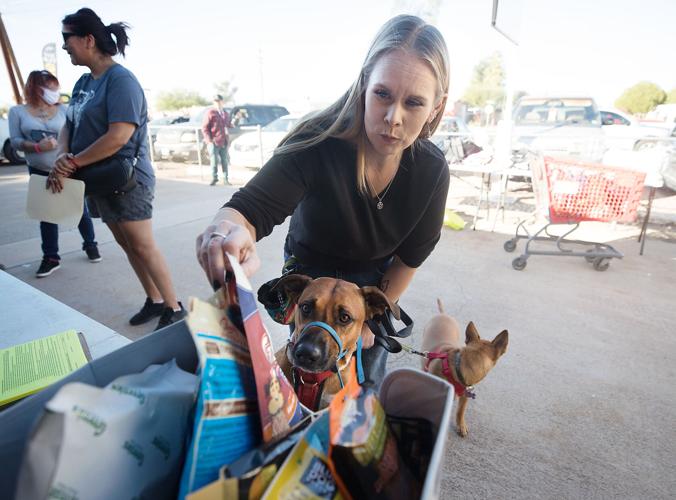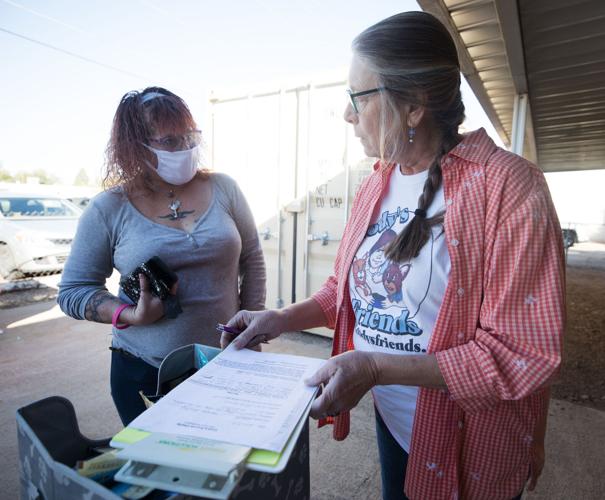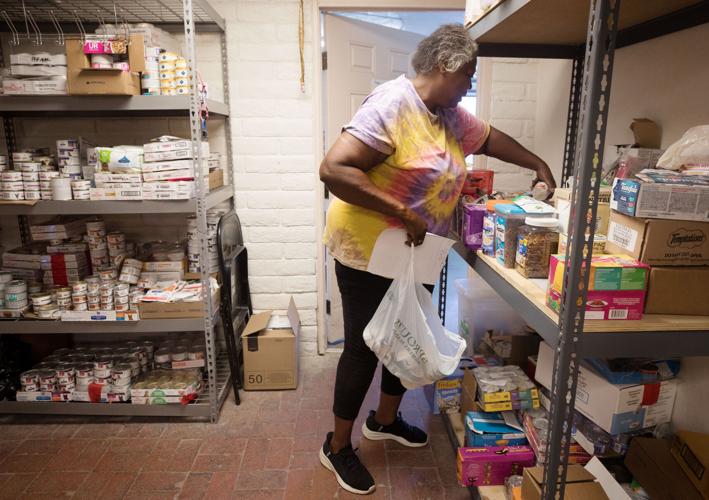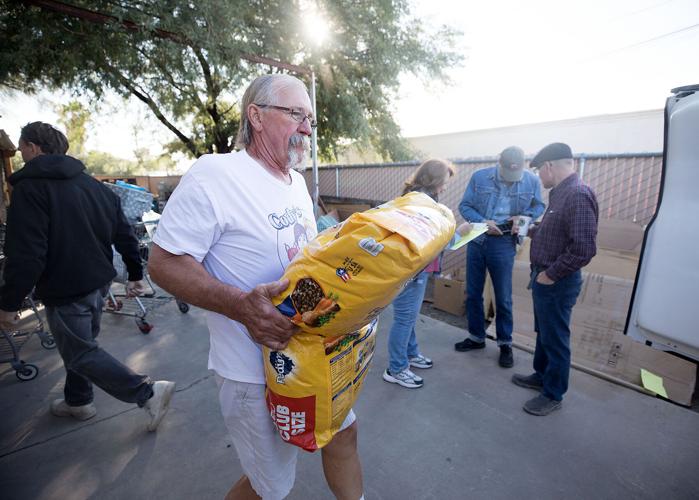Each Wednesday morning, dozens of people — many with dogs in tow — stand in line outside a building on Tucson's north side to pick up free pet food.
Amid rising rents, increasing evictions and inflation, the need is greater than ever for thousands of families who rely on Cody's Friends, a long-time nonprofit here, to help feed their dogs and cats, says its director, Amber Allen.
New requests and new faces come in every week, Allen says.
Cody's Friends is one of several groups in the community working to help pets stay in their families and out of Pima County's overcrowded shelter.
For those who aren't able to make the trip to Cody's Friends there are other pickup options at nearly 50 human services organizations across southern Arizona. These include the Tucson police and fire departments, Casa Maria Soup Kitchen, Marana Food Bank, Gospel Rescue Mission, the Salvation Army and more. Some of the groups need more than 3,000 pounds each month.
Many of these organizations pick up food from Cody's Friends weekly, with the volume steadily increasing over the years.
But if prices and the number of people seeking food keep going up, Allen said the group will need the community's help to keep up with the ever-increasing demand.

Becky Abbott, left, checks in with Terry Brite, a volunteer, during distribution day at Cody’s Friends.
'No one anticipated this'
Cody's Friends was started in 2010 by Amber Allen's son, Cody.
Then in the fifth grade, Cody — now a student at the University of Arizona — was inspired by a John F. Kennedy quote about helping the community.
The organization started out simple, with Amber and Cody Allen picking up donations and dropping food off to people in need.
As the years passed their method became unsustainable, and they found a brick and mortar location.
With no paid staff, all of the money raised by Cody's Friends goes towards the purchase of food.
Cody's Friends Charity provides food and provisions to dogs and those in need. The charity has 48 drop off boxes around Southern Arizona and they are always in need of dry dog food according to volunteer Amber Allen. The non-profit is also looking for leashes, blankets and other donations year-round. For more information visit CodysFriends.org. Video by Pascal Albright / Arizona Daily Star
"The numbers of people that are coming and the number of people in need have really escalated," she said. "It's no longer just poor people, it's gone right up into the middle-income. Just because those people are middle-income doesn't mean they aren't living paycheck to paycheck."
In October, Cody's Friends spent nearly $14,000 on pet food. With increasing prices and need, Allen estimates the amount will climb to $20,000 in November and December. Allen and about 20 volunteers buy pallets of food each week at Costco, Sam's Club and big box stores. Allen estimated that Cody's Friends provided food for 600 pets during the last week of October.
On Monday, Allen received nine emails from new clients, many with multiple animals, seeking help with food. Allen said this volume of new requests is typical these days.
"No one anticipated this," Allen said of the current combination of financial and housing crises. "And I just don't know where we're headed."

Kathy Morrow, a volunteer, grabs a can of pet food during distribution day at Cody's Friends, a nonprofit on Tucson's north side.
'It’s not going to stop anytime soon'
Pima Alliance for Animal Welfare, a partner of Cody's Friends, aims to ensure that all of the county's pets have a loving home and care.
To do that it promotes adoptions, supports the inclusion of animal welfare into social services and provides animal welfare resources to people in need.
PAAW's Human Animal Bond Subcommittee works to support pet owners, especially vulnerable populations and older adults. The subcommittee initially focused its efforts on making sure people in the community knew what resources existed and where to find them, but the scope of its work has since expanded, said subcommittee chairwoman Marcie Velen.
The group's work primarily helps and supports existing organizations, through training, funding assistance and more. They've helped two mobile meal delivery services integrate pet food into their options for homebound clients, and assisted a local food bank in finding and stocking pet food.
The subcommittee has long been working to help create and support programs that provide temporary care for people who are entering the hospital or have a short-term need. Several years ago, with the goal of helping older adults entering the hospital for short-term stays, they researched similar programs across the country. But at the time, no local groups were interested in housing such a program.
During the pandemic, both Pima Animal Care Center and the Humane Society of Southern Arizona started facilitating short-term foster care for people who needed to isolate or ended up in the hospital. Both programs are still running, with fostering available for up to 90 days at PACC.
But with limited volunteer fosters, the need outweighs the current demand, Velen said.
"It boomed during COVID. Now it's very common and there are beaucoup programs around the country," Velen said. "But now with evictions and housing prices, it's a crisis. People's rents are going up overnight and they have 30 days to get out. If they've got pets, they've got a dilemma."
In late October, the subcommittee brought together representatives from animal welfare programs, human service programs, hospitals, homeless shelters and more for a brainstorming session about creating temporary caregiving options for people who need to be separated from their pets due to a hospital stay, housing instability or some other reason.
"People are now becoming more and more aware that this is a crisis and it’s growing and it’s not going to stop anytime soon," Velen said.
The event was well-attended, with participants splitting into five groups to discuss ideas for five programs. A final report on the discussions is expected in upcoming weeks along with steps to take next.
Velen's involvement in animal welfare doesn't end with PAAW. She's also co-chairwoman of the nonprofit No Kill Pima County, which works to support Pima Animal Care Center, primarily through helping to keep pets out of the shelter.
The group has an extensive list of resources on its website directing people to assistance with pet food, spay and neuter surgeries, vaccine clinics, low-cost vets and more.
During the pandemic, the group decided to allocate all its financial resources to helping people with veterinary expenses, which Velen said is one of the main drivers for cats and dogs entering the shelter.
Over the last year, No Kill Pima County was able to help more than 500 animals receive veterinary care and stay out of local shelters.
The more pets that stay out of Pima Animal Care Center, the higher its live release rate will be, which is critical in sustaining the success PACC has had in its outcomes in recent years, Velen said.
"Creating a no-kill shelter and sustaining a no-kill shelter are very difficult," she said. "Sustaining it can be difficult. Trying to keep pets out of the shelter (is) the primary way we can help PACC."
' We just want to help'
Pima Animal Care Center has employed a battery of methods in recent years to try to help families struggling to keep their pets, said spokeswoman Kayleigh Murdock.
In addition to regular outreach events for food distribution, PACC also gives out supplies, including beds, boots and even leashes and collars.
"All that stuff is so important," Murdock said. "A collar and leash might not seem like a big thing, but that's the thing that's going to keep your dog with you."
Created during the early days of COVID-19, PACC created its safety net program that connects pets with foster families for up to 90 days. There are currently 66 animals in the program, with hundreds of pets receiving short-term foster care in the program's short lifespan.
"We've seen the need skyrocket lately," Murdock said of the program. "But we've also seen so many awesome reunions."
PACC also routinely hosts microchip clinics, with stray animals making up a large part of PACC's intake numbers.
"We know that having a microchip makes it significantly more likely that an animal will find its way back to its owner," she said. "That's really our goal, keeping families together."
Attendance at microchip clinics has been historically robust, with people lining up well before the event starts to ensure they're able to get one for their pet, Murdock said.
The shelter's nonprofit arm, Friends of PACC also has a medical fund to help owners with veterinary expenses, if the medical issue would cause the animal to end up being surrendered to PACC in order to receive care.
Friends of PACC is currently raising funds for a medical outreach van that will offer veterinary care on the go, including vaccines, microchips and other small services.
"We really want to expand our reach into the community. We want to do more of actually physically getting out there and helping," she said. "And a lot of our ability to do outreach work is through Friends of PACC. They really have helped us a lot in terms of outreach and developing that program."
PACC's animal protection officers regularly do outreach, whether that be trying to reunite an animal in the field or providing supplies or guidance to owners in need. The shelter also has a pet support center, with staffers who field calls from Monday through Friday, talking to people and providing resources to increase the likelihood that the pet won't be surrendered.
"At the end of the day, we just want to help," Murdock said.

Volunteer Lowell Kaiser loads a bag of pet food into a van during distribution day at Cody's Friends, which also partners with 48 human service organizations in Southern Arizona, who distribute pet food to people who can't get to Cody's Friends on their own.
'They are members of a family'
PACC is one of just a few dozen U.S. shelters involved in a pilot program through American Pets Alive's Human Animal Support Services.
Its primary goal is to keep animals with their families and in their communities by finding community-based rather than shelter-based solutions, said director Vincent Medley.
The program engages shelters to empower their staff and programs to help resolve the problem without the animal ever entering the shelter.
"There's no such thing in our mind as a human problem versus an animal problem," Medley said. "They are members of a family and they all live together."
Medley called HASS' and related efforts the most innovative movement in animal welfare. A cross-section of experts came together at its outset in 2020 to discuss the most important questions in animal welfare and create solutions.
From that effort came a pilot program of shelters to help master and perfect those solutions and help other shelters learn from their experiences.
"We're working with those shelters to really create a series of proofs that show the efficiency, cost savings and community empowerment of programs that we believe work, and ones that actually have already been implemented by shelters," Medley said. "The end goal is for animal services to be seen as a social service agency."
HASS uses analytics and shelter science to validate all of its findings and programs, so the evidence of their effectiveness is built-in, Medley said, adding that he hopes to see them become the industry standard.
HASS' methods have received validation from local governments, including Pima County, which Medley said hopes will help to make permanent changes in the culture of animal sheltering.
"I'm proud of the work (PACC is) doing," Medley said. "I did a lot of training there ... so I'm very invested in how they're doing."
Other shelters could learn from Pima County that changing priorities and shifting the culture is a slow process, and while it's good to look at end results, the real question should be, what did it look like at the start?
"It takes time to changes staff confidence, programming, community credibility and repair some bridges that were broken because of the old way of operating," Medley said. "Pima County is the perfect example of how bridges can be built back. But it has to be making the solutions community-oriented and looking at the community first as a solution and not the shelter. Once most people hear and understand that as the approach, they’re more than happy to support and be a part of that solution."
Cody's Friends is a non-profit that was started in 2010 by a fifth grader named Cody. The organization collects food and monetary donations to help feed Pima County pets. Cody's Friends partners with 48 human services organizations to help distribute the food. Video by: Mamta Popat, Arizona Daily Star








